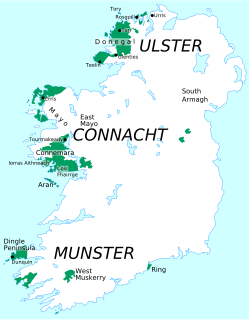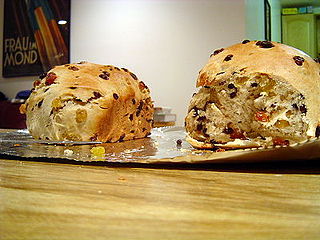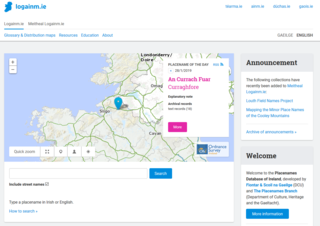
Gaeltacht is an Irish-language word for any primarily Irish-speaking region. In Ireland, the term Gaeltacht refers individually to any, or collectively to all, of the districts where the government recognises that the Irish language is the predominant vernacular, or language of the home.

The British Islands is a term within the law of the United Kingdom which since 1889 has referred collectively to the following four polities:

Foras na Gaeilge is a public body responsible for the promotion of the Irish language throughout the island of Ireland, including both the Republic of Ireland and Northern Ireland. It was set up on 2 December 1999, assuming the roles of the Irish language board Bord na Gaeilge, the publisher An Gúm, and the terminological committee An Coiste Téarmaíochta, all three of which had formerly been state bodies of the Irish government.
Foinse was an Irish-language newspaper in Ireland. It was published in both printed and digital form, but in September 2013 the publisher Móinéar Teo. announced that Foinse would no longer be available in print after that month. It was confirmed, however, that Foinse would continue to provide an online news service until 2015 when the website was closed down.

Barmbrack, also often shortened to brack, is a quick bread with added sultanas and raisins. The bread is associated with Halloween in Ireland, where an item is placed inside the bread, with the person who receives it considered to be fortunate.
Dr. Caoilfhionn Nic Pháidín is an author and academic, previously of Dublin City University, Dublin, Ireland. She served on the government agency Coimisiún na Gaeltachta from 2000 to 2002. She is also a co-founder of the Irish language publishing firm Cois Life.
Seachtain na Gaeilge le Energia is an annual international festival promoting the Irish language and culture, both in Ireland and all around the world. Established in 1902, it is the biggest Irish language festival in the world, reaching over 1 million people on 5 continents each year.
An Gúm was an Irish state company tasked with the publication of Irish literature, especially educational materials. The agency is now part of Foras na Gaeilge. Its mission statement is "To produce publications and resources in support of Irish-medium education and of the use of Irish in general." It is the largest publisher of books in Irish in the country. Seosamh Ó Murchú is the current Senior Editor.

Boreen or bohereen is a country lane, or narrow, frequently unpaved, rural road in Ireland.
This is list of Irish language exonyms for places outside Ireland. The tables contain both exonym and endonym of places around the world. The exonyms in Irish and the endonyms in their regional language.
The Foclóir Stairiúil na Nua-Ghaeilge project was started in 1976 with the aim of creating a historical dictionary for Modern Irish. The dictionary will cover a period from 1600 to the present day. In contrast to most existing Irish dictionaries, this will be an Irish–Irish dictionary. Most others, including the highly regarded de Bhaldraithe and Ó Dónaill dictionaries, are Irish–English bilingual dictionaries.

Cuil was a search engine that organized web pages by content and displayed relatively long entries along with thumbnail pictures for many results. Cuil said it had a larger index than any other search engine, with about 120 billion web pages. It went live on July 28, 2008. Cuil's servers were shut down on September 17, 2010, with later confirmations the service had ended.

The Placenames Database of Ireland, also known as logainm.ie, is a database and archive of place names in Ireland. It was created by Fiontar, Dublin City University in collaboration with the Placenames Branch of the Department of Culture, Heritage and the Gaeltacht.

Drains Bay is a small residential and commuter settlement about 3 kilometres (1.9 mi) north of Larne and south of Ballygalley on the coast of County Antrim, Northern Ireland.

Acadamh na hOllscolaíochta Gaeilge is a third level educational and research institution headquartered in Galway, Ireland. It was established as part of the city's University in 2004, to further the development Irish-medium education. The academy works in co-operation with faculties, departments and other university offices to develop the range and number of programmes that are provided through the medium of Irish on campus and in the academy's Gaeltacht centres.

The official status of the Irish language remains high in the Republic of Ireland, and the total number of people who answered 'yes' to being able to speak Irish in April 2016 was 1,761,420, which represents 39.8 per cent of respondents out of a population of 4,921,500 in the Republic of Ireland. In Northern Ireland 104,943 identify as being able to speak Irish out of a population of 1,882,000. The official status reflects the dominance of the language in Irish cultural and social history until the nineteenth century and its role in Irish cultural identity, even though the daily use of Irish today is limited.

Feasta is an Irish-language magazine that was established in 1948. Its purpose is the furtherance of the aims of Conradh na Gaeilge, an objective reflecting the cultural nationalism of the language movement, and the promotion of new writing. Feasta describes itself as a review of Irish thought, literature, politics, and science. Until recently it was supported financially by Foras na Gaeilge, but this support was withdrawn because of a review of funding priorities. At present the magazine relies on its own resources.
Lexicography evolved in order to serve one of two needs i.e. in order to explain in a simple way difficult words and expressions or in order to explain the words and expressions of one language in another. In this case we can trace the tradition of lexicography in Irish back to the 8th century.
Tuairisc.ie is an online Irish language newspaper. The company's offices are in Bearna.










